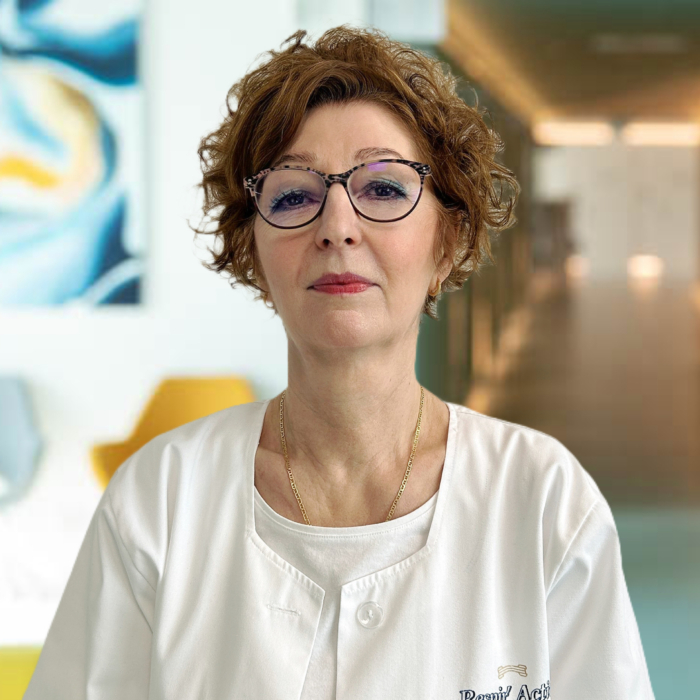
Most colorectal cancers develop from so-called polyps. Polyps are considered to be pre-cancerous conditions and are not malignant in themselves, but they can later develop into colorectal cancer. In Hungary, there are nearly 10,000 new cases of colon cancer every year, making us unfortunately the second worst in Europe. As with all cancers, early detection is important for colorectal cancer, as the chances of cure are much better at an early stage.

March is Colorectal Cancer Prevention Month. We have prepared a blog article on this topic. It will cover the most important information, taboo topics and useful facts on the subject, so that you can take preventive steps in a conscious way.
In Hungary, 10,000 cases of colon cancer are diagnosed every year. Half of these cases still end in death, even though this type of cancer has a very high cure rate if detected early! Regular screening SAVES LIFE!
Malignant tumours of the colon can remain asymptomatic for a long time, which is why screening for colorectal cancer is of particular importance. The most common symptoms are bloody, baggy stools, diarrhoea, changes in bowel movements, abdominal cramps, bloating and weight loss. Generally, as the tumour grows, symptoms become more pronounced.
The most commonly used method is a faecal blood test, for which a stool sample is all that is needed. The technique is simple, cheap and convenient, but its sensitivity is not 100%. The most reliable method of screening for colorectal cancer is colonoscopy, which can be performed under general anaesthesia without any discomfort. As the test can remove polyps, it can also prevent the development of colon cancer. If a suspicious tumour is found, a histological sample can be obtained during the colonoscopy. If the sample confirms the presence of malignant cells, further tests are required, commonly known as ‘staging’. This involves ultrasound, CT, MRI and less commonly PET-CT scans to look for the presence of tumour metastases in the lymph nodes or other organs, particularly the liver and lungs. Knowing the stage of the tumour is essential to plan the appropriate treatment.
The treatment of colorectal cancer always requires a complex team approach. This team consists of an oncology specialist, an oncologist, a radiotherapy specialist, a radiologist, a pathologist, a stoma specialist and an onco-psychologist. The stage at which the tumour is detected determines the extent and order in which the oncologist, the radiotherapist and the oncology specialist are involved in the patient’s care. In all cases, the treatment plan is decided or approved by a team of specialists, called an ‘onco-team’.
Surgery plays a central role in the complex therapy of colorectal cancer. Modern oncological surgery involves the removal of the tumorous colon section with an appropriate safety zone, as well as the chain of lymph nodes and lymphatic vessels supplying the affected colon section. The continuity of the bowel is restored with sutures or special suturing machines.
Depending on the part of the colon where the tumour is located, a right or left colon resection (right or left hemicolectomy), a segmental resection of the colon, a sigmoid colon or a rectal resection may be performed. Depending on the location of the rectal tumours, temporary or, in rare cases, permanent bowel evacuation (stoma) may be required during surgery.
The majority of operations can be performed without an abdominal incision using laparoscopic surgery, a technique that reduces post-operative pain and helps speed recovery. Based on histological examination of the tumour and associated lymph nodes removed during surgery, the ‘onco-team’ will recommend any chemotherapy that may be needed.
The treatment of tumours of the rectum is somewhat different from that of other parts of the colon. For early stage rectal tumours, local excision through the rectum (TAE) or total wall excision with a special surgical microscope (TEO, TAMIS) may be performed in some cases. For more advanced rectal tumours, these techniques are not sufficient and partial or total removal of the rectum may be necessary. In these cases, surgery is often preceded by radiotherapy, which reduces the rate of tumour recurrence and increases the chances of sphincter-preserving surgery. Also in the case of rectal tumours, the results of histological examination determine the need for chemotherapy.
If metastases develop in the liver, surgical removal should also be sought. This can be done before, at the same time as or after intestinal surgery. In the majority of cases, surgical treatment is combined with chemotherapy for a better outcome. Some liver metastases can also be removed by laparoscopic technique.
Colonoscopy or colonoscopy is a test used to investigate or diagnose bowel cancer and other bowel diseases. A colonoscope is a tiny camera mounted on a long, flexible tube to examine the entire length of the colon. It can be used to take tissue samples and remove any polyps, as well as to stop bleeding.
Colonoscopy is often done to check what is causing bowel symptoms such as:
Many people have polyps in their intestines, which are tiny growths and in most cases are harmless. However, sometimes they can become cancerous tumours and may be removed and examined during a colonoscopy.
Colonoscopy can be used to look for bowel diseases such as:
Crohn’s disease,
diverticular disease or diverticulitis,
ulcerative colitis,
colon or rectal cancer.
Colonoscopy can be performed without or with anaesthesia. The procedure is painless, rather than uncomfortable. At the Wáberer Medical Center, most procedures are performed under a superficial anaesthetic, which puts the patient into a deep stupor and then into a sleeping state. They will be fully awake within half an hour to an hour after the procedure. A big advantage is that the patient is spared any unpleasant experiences and can typically return to their daily activities quickly.
Before the examination, the patient is asked to lie on the examination table with legs raised. During a colonoscopy, your doctor will insert a flexible tube with a camera into your anus and up into your rectum and colon. Air is then passed into the colon to help it dilate. The doctor looks for abnormal tissue and takes a sample (biopsy) for further tests. The procedure usually takes about 20-30 minutes.
 Dr. Dubóczki Zsolt
sebész, mellkassebész, klinikai onkológus, robotsebész
magyar, angol
Doctors magyar, angol language
18+
Patients 18+ from ages and up
Dr. Dubóczki Zsolt
sebész, mellkassebész, klinikai onkológus, robotsebész
magyar, angol
Doctors magyar, angol language
18+
Patients 18+ from ages and up
 Prof. Dr. Herszényi László
gasztroenterológus, belgyógyász, klinikai onkológus, klinikai farmakológus szakorvos
magyar, angol, olasz, román
Doctors magyar, angol, olasz, román language
18+
Patients 18+ from ages and up
Prof. Dr. Herszényi László
gasztroenterológus, belgyógyász, klinikai onkológus, klinikai farmakológus szakorvos
magyar, angol, olasz, román
Doctors magyar, angol, olasz, román language
18+
Patients 18+ from ages and up
 Dr. Zaránd Attila, PhD
sebész, proktológus szakorvos
magyar, angol, német
Doctors magyar, angol, német language
16+
Patients 16+ from ages and up
Dr. Zaránd Attila, PhD
sebész, proktológus szakorvos
magyar, angol, német
Doctors magyar, angol, német language
16+
Patients 16+ from ages and up
 Dr. Beck Zsuzsanna
radiológus főorvos
magyar
Doctors magyar language
0+
Patients 0+ from ages and up
Dr. Beck Zsuzsanna
radiológus főorvos
magyar
Doctors magyar language
0+
Patients 0+ from ages and up
 Dr. Jakab Lajos
radiológus szakorvos
magyar
Doctors magyar language
10
Patients 10 from ages and up
Dr. Jakab Lajos
radiológus szakorvos
magyar
Doctors magyar language
10
Patients 10 from ages and up
 Dr. Szomják Anett
radiológus szakorvos
magyar és angol
Doctors magyar és angol language
Dr. Szomják Anett
radiológus szakorvos
magyar és angol
Doctors magyar és angol language
 Dr. Váradi Éva
radiológus szakorvos
magyar, angol
Doctors magyar, angol language
12+
Patients 12+ from ages and up
Dr. Váradi Éva
radiológus szakorvos
magyar, angol
Doctors magyar, angol language
12+
Patients 12+ from ages and up